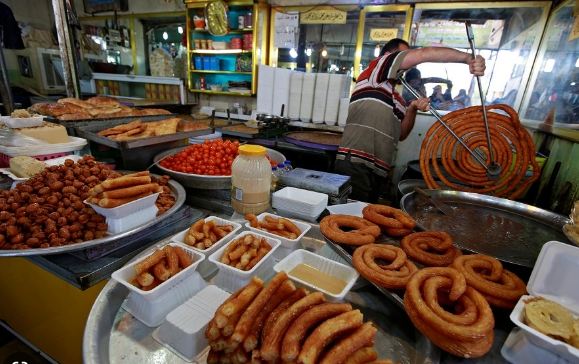Gur-made Rajjar sweets attracts people on eve of Eid
PESHAWAR, Apr 21 (APP):Made of 'Gur', the traditional Rajjar Methai (sweet) of the Charsadda district on Friday attracted a large number of buyers at its outlets.Rajjar, a small bazaar of Charsadda district with plenty of sweet shops, has started attracting sweet lovers in droves from across the province especially from Peshawar, Mardan, Mohmand, Khyber, Swabi and Nowshera districts due to its affordable price and delicious taste.
Located about one kilometer north of Charsadda City, Rajjar bazaar has now turned into a sweets market where a great rush of buyers is being witnessed in all bakery shops.
The traditional sweet was brought in substantial quantity in Peshawar, Charsadda, Swabi, Nowshera and Mardan districts where Rajjar sweets are being sold like a hot cake on eve of Eid.
The consumers are being seen standing in long queues in front of sweet shops to buy famous tasty sweets being the identity of Charsadda despite the fast of Ramazan.
Muhammad Yaqoob, an owner of Razzar Sweet told APP that this hard-earned business was started by his grandfather Israruddin alias Chacha Halwai in 1930 and was proud to continue his legacy of being belonged to third generation running it today.
He said the delicious quality of the sweet differentiates it from the rest of the confectionaries in local markets due to its better taste, chemically free and affordable price.
The people serve it to relatives, friends and guests as a special item on various occasions including Eid, weddings and children’s birthday parties to strengthen the bond of love and friendship.
It is a preferred choice of many poor and white-collar people being sold for Rs 400-450 per kilogram in local markets.
Yaqoob said the recipe for the popular sweet had changed over the years, adding only butter, flour and gur were used by his grandfather in its preparation as sugar was not available in those ancient days.
Nowadays it was being prepared with various ingredients including desi ghee, milk, butter, gur and white flour to enhance its taste, he added.
He said about 50,000 to 60,000 people were directly or indirectly associated with this business.
The popular sweet draw traders from Afghanistan and the Central Asian Republic while marching to the subcontinent via Charsadda and Peshawar through GT Road.
The orders placed by the traders from different parts of Khyber Pakhtunkhwa, Sindh, Balochistan, Azad Kashmir and Punjab were dispatched as Eid special offers.
The inter-provincial businessmen and traders have made substantial investments by purchasing huge stocks of the confectionary to cater to consumers’ high demands for Eid, besides earning maximum profits.
The local people also send the sweets as a gift to their friends and relatives, living in other parts of the country and abroad.
Yaqoob said it was being exported to Saudi Arabia, Afghanistan, Iran, Syria and several Middle Eastern countries, besides being sent to the US, UK and other Western states as a gift for friends and relatives.
“Rajar sweet is my first choice on Meeti Eid. I purchased 20-kilogram sweets including five KG each for my married sisters, maternal uncles and relatives as special Eid gift,” said Umar Khan, a resident of Pabbi.
“I personally like it because it is prepared in milk and gur making it more delicious, tasty and free of adulteration,” he said.
He said Pakistan can earn valuable foreign exchange by exporting the traditional confectionery to international markets.
Focus should be made on its marketing by involving foreign missions to explore new avenues for this popular product.
Zeeshan Khan, an official of the KP Forest Department said that Rajjar sweet was an essential part of his shopping and his Eid seemed incomplete without it.
Yaqoob said the coronavirus pandemic, floods and inflation had affected the business and shopkeepers suffered substantial economic losses.
He urged KP government to announce a relief package for the affected shopkeepers of Rajjar sweets.
The shopkeepers and manufacturers demanded for giving Rajjar sweets the status of the industry and special incentives to people associated with this old business to earn valuable foreign exchange for the country.

















